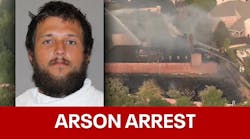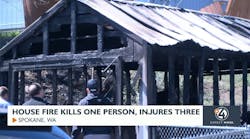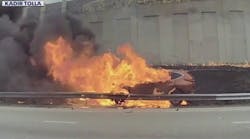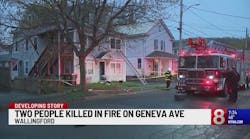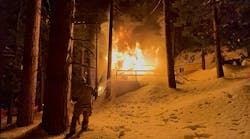As a fire service we are failing in our public relations efforts if we are not capitalizing on national movements.
The one thing that I have realized about the fire service is that we have never been very good at self promotion. We go to work, we do our jobs, we don't complain beyond the station bean table and we don't boast. We go home and tell our family and friends the shift was "just routine." When praised by the public we modestly say, "We were just doing our job." Then we act surprised when something in our department gets eliminated or we are given more responsibility without the additional resources. We have the nerve to say, "People just don't understand what we do?" If that is the case, then the fault is ours!
With the economic downturn and communities looking to cut budgets, we can no longer afford to be so "blue collar" and modest. We need to get to mountain tops, to scream and pound our chests. Recently national organizations gave us an opportunity to make that climb and a bullhorn with which to scream. How many departments took advantage of that?
On Wednesday, January 7, the National Association of State Fire Marshals along with the U.S. Fire Administration declared a national fire emergency as a result of several multiple fatality fires across the U.S. This has resulted in national media attention on both the upswing of fires and important fire safety messages. For some reason the media believes this is news, but those of us in the trenches know otherwise. Fire has always been a problem -- homes are burning today and people are dying today in fires caused for the same reasons they were 50 years ago.
So while this may not be breaking news to us, we as a fire service are failing in our public relations efforts if we are not capitalizing on this national movement. While the national media is finally paying attention -- and it will be short lived -- you need to take advantage of this opportunity if you haven't already. With a little creativity and persistence you can, and you should, bring this media attention to your local community.
If your department has had a rapid rise in fires then this is an easy task. The constant media barrage of information and fire safety messages will have a big impact on your fire problems when your citizens hear your messages on the national media circuit, the local news and when your firefighters are out talking with the public and their family and friends.
But even if your department is not seeing a drastic spike in fires, study your statistics. How many close calls did you have? How many fires did you respond to that were not fully developed yet? How many fires were extinguished by the homeowner before you arrived? How many smoldering outlets or trash cans did your department respond to? These are still fires! I mean after all we need to remember what caused the Great Chicago fire - a spark?
When we buy apparatus, equip those apparatus, build stations and make manpower requests, we do not do that based solely upon what has happened in our community, but also what could potentially happen. And when we work with the media we need to do the same. You need to approach your public information plan with the same mentality and thought process as you do your strategic plan.
Local Example
Even though the Beaufort, SC, Fire Department has had a drop in fires, we were still able to successfully use the national declaration to draw media attention to our community and get important fire safety messages out. We have been able to demonstrate to our struggling local economic community that they still need to invest in a strong fire service.
- See how Beaufort used a national story: "Flaming finish to 2008 concerns city fire authorities"
Our department responded to 17 structure fires in 2007, which dropped to 10 in 2008. Hardly a "fire emergency," but we were determined to take advantage of this media interest. It also helped that the last three fires occurred between November and December and were covered by local media.
When looking more closely at our run reports we noticed we had 19 fires classified as "cooking fires confined to container." These were fire calls we responded to that were extinguished prior to our arrival. Again, as a fire service, we cannot ignore those statistics. Those were 19 potential house fires.
When talking with the media we discussed our drop in fires demonstrating that fire safety does make a difference, but focused on the fact that we also had 19 close calls. These were fires that occurred as a result of cooking fires, a common fire safety issue. This opened the door for us to take advantage of the national media attention and bring it local to get our fire safety messages out about a very important fire hazard in our community.
Every time we are watching the national news and see a fire on our televison screen, we need to be thinking and searching for ways to bring that coverage local and get our messages out. From major commercial fires to wildfires there is a local story there -- you just have to search for it.
"No news" could in fact "be news." When CNN is televising a major commercial blaze somewhere in the U.S., even though your community may not have had a commercial fire, an effective local media outreach could be on your aggressive fire prevention program that has prevented such fires from scarring your community. There are multitudes of ways to generate public awareness -- and thus support -- for your department, you just have to be creative and look at your department's numbers, statistics and programs.
You need to believe and communicate that every time your fire trucks go out the door that it is front page news and that every fire -- no matter how small -- could have had a devastating impact. If we fail to do this, should we then be so surprised when our public doesn't see or believe that fires are a problem? If our calls are "routine," and "no big deal," should we be so surprised when city hall looks to the fire department for cuts?
I mean after all, why do you need so much in your budget if your job "is just routine?"
DANIEL BYRNE, a Firehouse.com Contributing Editor, is a Lieutenant, EMT-P, with the City of Beaufort, SC, Fire Department and currently serves in the capacity of Fire Marshal, Public Education Officer and Public Information Officer for the City of Beaufort and Town of Port Royal. A 20-year veteran of the emergency services and a National Fire Academy Alumni, he is a veteran of the Desert Shield/Storm war with the U.S. Marine Corps. In 2006 the City of Beaufort Fire Department was awarded the South Carolina "Richard S. Campbell Award" for excellence in public fire safety education. To read Daniel's complete biography and view their archived articles, click here. You can reach Daniel by e-mail at [email protected].
